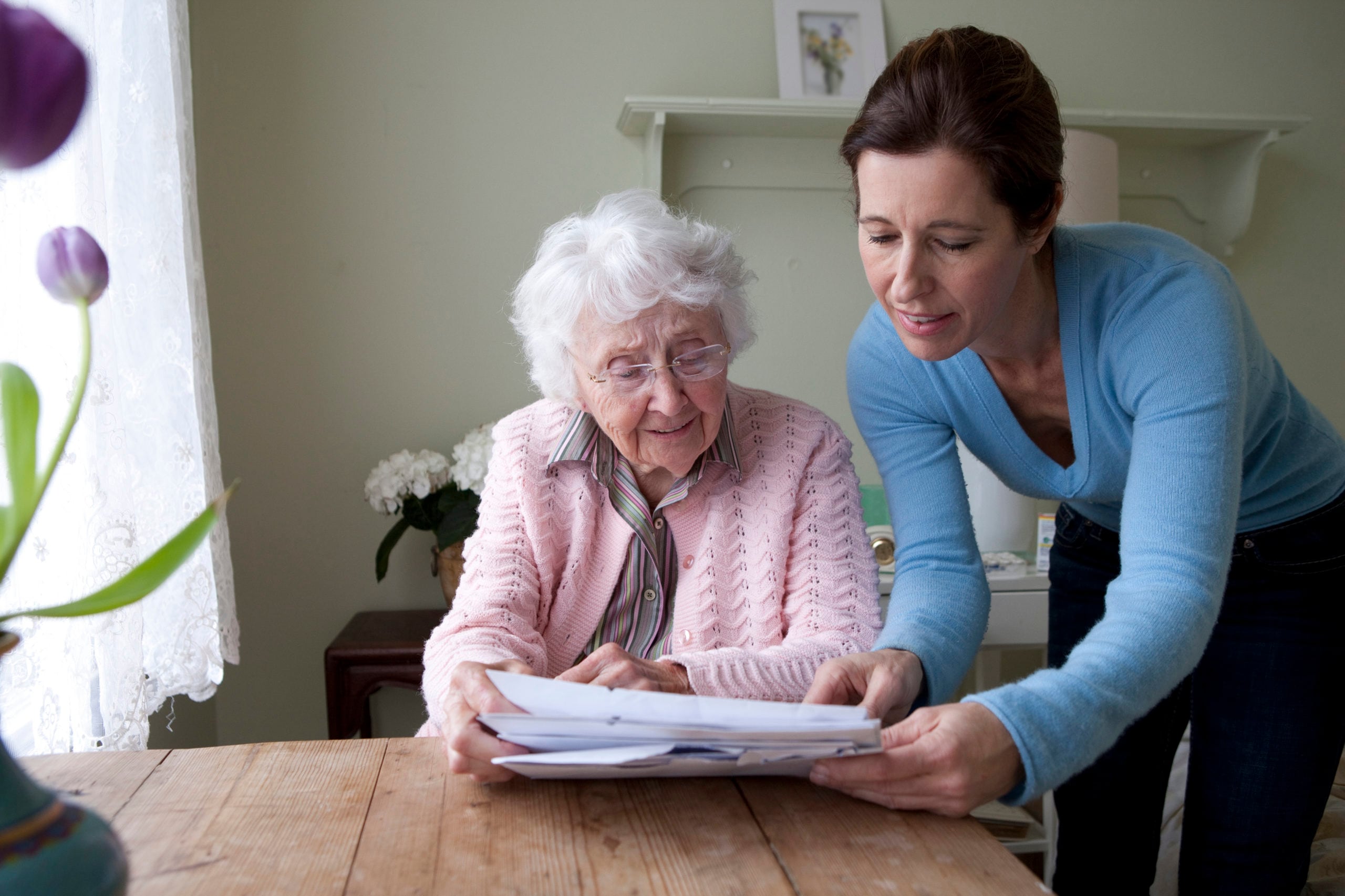In this article
Caring for elderly parents can be rewarding, but it’s not without stress and challenges. There usually comes a point in caretaking — whether you are a family member or a hired care provider — when it’s clear that the person you’re caring for needs more help than you’re able to provide.
When this happens, “it’s normal to feel anxious, guilty, sad and sometimes even angry,” says Dakari Quimby, a clinical psychologist in Los Angeles. “Many people fear that they… will make the wrong decisions or will face significant financial and personal strains.”
These worries are completely understandable, and so many people who’ve cared for elderly loved ones have been there. Accepting these emotions is the first step in finding seniors the help they need as they move into the next phase of life. Here, we’ll discuss the emotions and challenges that happen during the transition from taking care of aging parents to seeking higher levels of support, along with tips for navigating them.
Key takeaways
- Caring for aging parents is rewarding but often overwhelming, especially when they need more help than you can give.
- Signs like missed medications or physical decline may mean it’s time for extra support.
- Asking for help isn’t failure — it’s a necessary and caring step forward.
How do I know when my aging parents need more help?
If you are taking care of aging parents, or caring for an elderly client, you may be unsure of how to tell when a higher level of care is needed. Essentially, you can know an older adult needs extra help when they are no longer able to take care of themselves or are neglecting basic needs.
They may have increasing physical limitations, such as trouble walking or being more susceptible to falls. Additionally, they may develop a new health condition or a chronic condition may worsen. According to Christopher Norman, a board-certified geriatric nurse practitioner in Jamesville, New York, signs that your parent may need more help include:
- Unexplained weight loss.
- Poor eating habits.
- Noticeable bruising or injuries.
- Decreased mobility.
- Mental and cognitive decline.
- A messy or disorderly home.
- Poor personal hygiene.
- Mail piling up and bills unpaid.
- Missing medication.
- Missing doctor appointments.
What are the care options for my aging parents?
When it comes to finding a loved one more care, it’s vital to understand that you have options. There are many ways for seniors to be cared for, and the best type of care depends on several factors, including your loved one’s specific needs, their financial situation and what is available in their community.
Quimby and Norman suggest the following care options for families to consider when a senior in their life needs more support:
- In-home care, such as from a home health aide.
- Adult daycare centers for social support.
- Assisted living facilities for those who need a mix of independence and support, including meals and medical care.
- Continuing Care Retirement Communities (CCRCs), which offer differing levels of care as needs change.
- Nursing home for people who need 24/7 medical care.
- Skilled nursing facilities for people recovering from injuries or who need rehabilitation.
Where can I find resources and support when caring for elderly parents?
When you first suspect an older adult needs more care, the experts we spoke to suggest meeting with their primary care provider. It’s important to rule out a new health condition or cognitive issue that may be causing the problems you are seeing. Your loved one’s provider may also be able to discuss the best course of action going forward and how to obtain the services needed.
“It’s OK to need help. Asking for help shows strength, not weakness.”
— Christopher Norman, geriatric nurse practitioner
After this initial step, Quimby suggests connecting with one or more of the following for further support:
- Your local Area Agency on Aging for referrals and resources.
- Community organizations that have programs aimed at seniors.
- Support groups to connect with others facing similar challenges through local or online groups.
- Geriatric care managers (professionals who manage care for elders).
- Therapists or social workers to help manage caregiving-related stress, guilt or depression.
I feel guilty asking for more help
One of the hardest aspects about caring for elderly parents who need more support is coping with all the emotions you may be experiencing.
One common emotion in this situation is guilt, or feeling like you aren’t “good enough” because you weren’t able to take care of your loved one on your own.But asking for help is not a sign that you are less than in any way. “It’s OK to need help,” Norman emphasizes. “Asking for help shows strength, not weakness.”
Moreover, Norman adds, it can be helpful to keep in mind that virtually everyone needs extra help as they get older, and it’s simply not possible for any one person to provide someone’s care entirely on their own.
How can I bring up the need for extra care with my aging parents?
If you are caring for elderly parents and know they need more support, one stressor you might have is how to bring your concerns up with them. Quimby and Norman offer the following tips to help the conversation go smoothly:
Pick an appropriate time and setting
Quimby recommends choosing a comfortable setting, which may be the senior’s home or anywhere they feel relaxed. Also, make sure the interaction isn’t rushed, so that you have plenty of time to talk.
“Talk about what you’ve been noticing in a gentle way, and make it clear that you’re worried for their well-being.”
— Dakari Quimby, clinical psychologist
Keep things light and gentle
Taking a heavy-handed approach — piling on your worries and concerns — may upset your loved one. Norman recommends keeping the conversation casual at first, expressing your concerns using “I” statements rather than placing blame.
Speak calmly and kindly, Quimby adds. “Talk about what you’ve been noticing in a gentle way, and make it clear that you’re worried for their well-being.”
Let your loved one take the lead
Asking your loved one open-ended questions can be helpful. You can ask them how they think they’re doing with their daily routines and how well they think they are managing, Quimby suggests.
Norman recommends asking them how they see their future unfolding and whether they think their life as it is now is working for them. “Tell them you want to work together to help them maintain their independence,” Norman says.
Be a good listener
As much as possible, listen to your loved one and take their feelings and needs into consideration. “It’s important to listen to their feelings and preferences and to make it clear that you want to work together to find the best solutions,” says Norman. “Neither ‘side’ will likely be 100% satisfied with each other’s solutions, but listening and maintaining empathy will get better results than arguing.”
Try to keep perspective
If we live long enough, almost all of us will need extra help at some point. Most family members can’t provide 100% of this support themselves and need to rely on outside help. This may be because of other obligations, such as work or kids, financial constraints or the fact that aging parents need higher levels of medical care.
Either way, whether you are providing the care yourself or arranging this care, when you are in charge of your loved one’s care, it’s essential to remember to take care of yourself, too. “Taking care of yourself is most important as it enables you to be a better caregiver,” Quimby stresses.





